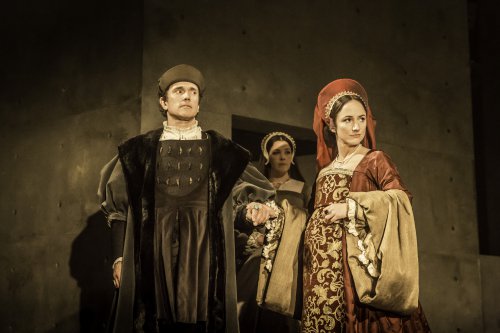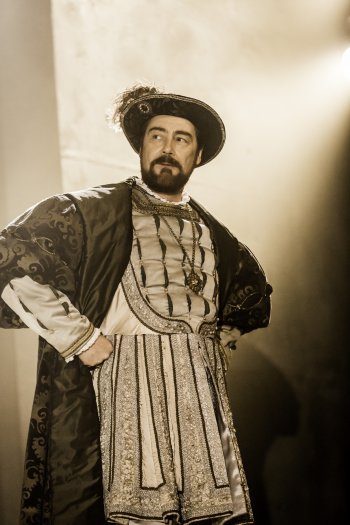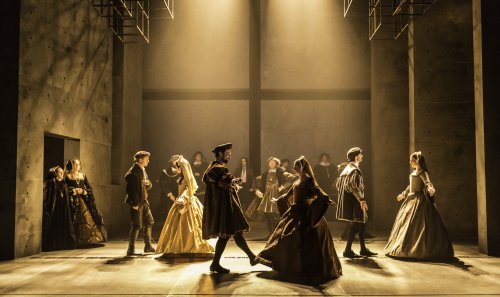Wolf Hall, Parts One & Two
Royal Shakespeare Company’s epic production of the story of Thomas Cromwell, Henry VIII and Anne Boleyn from the Hilary Mantel novels is intellectually and historically challenging.
[avatar user=”Victor Gluck” size=”96″ align=”left” ] Victor Gluck, Editor-in-Chief[/avatar] Everything about the Royal Shakespeare Company’s production of Wolf Hall is epic. A company of 23 actors play 44 parts in this stage version of both of Hilary Mantel’s Man Booker Award winning novels, Wolf Hall and Bring Up the Bodies, which total 1,000 pages. Performed in two parts, each play takes two hours and 45 minutes. Those who have read the novels know that it tells the story of King Henry VIII’s second and third marriages but told through the eyes of Thomas Cromwell, the blacksmith’s son who rose to be Keeper of the Rolls and Secretary to the King, the first commoner to do so.
As deftly adapted by British playwright Mike Poulton and vigorously directed by Jeremy Herrin, the plays on the stage of the Winter Garden vividly bring to life the British court and its intrigue during the early sixteenth century, from about 1529 – 1536. Poulton wisely leaves out Cromwell’s childhood and youth described in the first novel and begins with him as lawyer to Cardinal Wolsey where the real story begins. However, like the published books, many of the major events take place between the scenes and the characters meet up to discuss the outcome. These are not plays for those who have not read the novels or are not familiar with the historical events or characters as there are too many people and relationships to keep straight if one doesn’t. Nine of the actors play one character each, the rest play between two and four.
The plays take place on a unit set by Christopher Oram, a huge Elizabethan hall with neutral colored walls and a huge two story cross on the back which could be read as a religious object in this story of the Protestant reformation in Britain or timbers of a Tudor mansion. What gives the play color is Oram’s eye-filling panoply of royal costumes for the 44 characters, mostly members of Henry VIII’s court. In the course of the two plays, Anne Boleyn’s gowns go from yellow to red, to white for her coronation, to olive and finally to black. Henry’s ensembles in this era when men’s attire was as rich as women’s are equally elaborate, accessorized with furs, jewels and elaborate hats. Also the lighting design of Paule Constable for Part One and David Plater for Part Two makes excellent use of fires in various places on stage which add to the visual excitement.

Ben Miles as Thomas Cromwell and Lydia Leonard as Anne Boleyn in a scene from the RSC’s “Wolf Hall” (Photo credit: Johan Persson)
The first play describes Henry VIII’s desire for a male heir and his subsequent divorce of his wife Queen Katherine of Aragon who has only given him a living daughter, Princess Mary. This causes the downfall of Cardinal Wolsey (for whom Cromwell works as a lawyer) when he is unable to deliver an annulment from the Pope. The play continues through Henry’s break with Rome and his subsequent marriage to Anne Boleyn. Newly crowned Queen Anne gives birth to a daughter Elizabeth and the disappointed Henry’s attention is shifted to Jane Seymour, one of her ladies-in-waiting. Part One ends with the downfall of Sir Thomas More, the Lord Chancellor, who refuses to sign the Oath of Allegiance that made Henry the head of the Church of England and Anne the rightful queen. Through all of this Cromwell rises as the King’s most trusted counselor.
The second part picks up with Henry’s pursuit of Jane and his wish to rid himself of Anne who has miscarried with their second child. He leaves it to Cromwell to find a pretext for a divorce. What Cromwell discovers is that there may well be grounds for adultery as Anne as queen has remained just as flirtatious as she was before her marriage. It also gives him a longed for opportunity to wreak his revenge on those who brought down his beloved Cardinal Wolsey. This half ends with the execution of the disgraced queen and Henry’s marriage to Jane Seymour. Part Two is actually the more dramatic and focused of the two plays as Cromwell’s pursuit of evidence against the queen gives it a through line and a coherence that the more diffuse first half which has more stories to tell does not.
The title refers to the estate of the Seymour family, which while the story spends little time there, is the perfect metaphor for the backbiting and betrayals of Henry’s court. The play uses little in the way of furniture in the manner of the Elizabethan theater. However, director Herrin who had the enormous job of staging the plays’ many episodes has chosen to have blackouts between them and not bring up the lights until the characters in the next scene have arranged themselves in a tableau, rather than have them come on stage as the previous actors depart. This tends to make the play a bit longer than it might have been and gives the plays a leisurely pace.
As Thomas Cromwell, Ben Miles is on stage almost throughout each play and is fine as a man who is pragmatic, shrewd, articulate and ruthless. He is the ultimate political animal, able to stay afloat in any shark infested waters. He knows how to say little when necessary and when to flatter to gain his objective. Ultimately, he is revengeful, hounding his enemies to their doom. There are two differences between the Cromwell on stage and the one in the published novels. In the books, we hear his thoughts and understand his motivations, his fears, his desires, this boy who came from nothing to become the king’s chief counselor. As Wolf Hall has no soliloquies, all of this is unfortunately left out and Cromwell remains (even at the end of the two plays) an enigma. In the books, Cromwell is painted as something of a saint while his adversary, Sir Thomas More, is painted as a monster. Both of these portraits have been softened by playwright Poulton and in the plays they are about equal and the balance is a draw.

Nathaniel Parker as King Henry VIII as he appears in the RSC’s “Wolf Hall” (Photo credit: Johan Persson)
Nathaniel Parker who previously appeared on Broadway as Bassanio with Dustin Hoffman in the 1989 Sir Peter Hall production of The Merchant of Venice is a colorful King Henry VIII. He makes him both sympathetic and capricious. We see his humanity, his personal needs and his care for his subjects. Usually a level-headed monarch, we also see his tempestuous side when he doesn’t get what he wants. Lydia Leonard’s Anne Boleyn is equally a three-dimensional character: spoiled and selfish, flirtatious and cunning, ambitious and social climbing, a woman who knows how the game is played. Her seemingly outrageous demands make her a great many enemies but we also see the gradations from her rise to her fall as she matures and finally realizes that she has lost.
The doubling of roles is quite clever, giving actors totally contrasting roles which makes it a challenge to recognize them. Best among them is Paul Jesson who plays a corrupt, luxurious and witty Cardinal Wolsey, then reappears as the toadying courtier Sir John Seymour (Jane’s father) and later as the competent and professional Sir William Kingston, Constable at the Tower of London. Lucy Briers is also remarkable as the vicious-tongued and bitter Jane, Lady Rochford, sister-in- law to Anne Boleyn, as well as the sympathetic and very moving Queen Katherine of Aragon, Henry’s castoff wife of 18 years. Matthew Pidgeon shows his versatility as the sarcastic Stephen Gardiner, first secretary to Cardinal Wolsey, then Master Secretary to the king and finally the Bishop of Winchester (Cromwell’s enemy) as well as the consummate European diplomat Eustache Chapuys, London Ambassador from King Charles V, the Holy Roman Emperor.
Also memorable as arrogant royal courtiers are Edward Harrison as George Boleyn (Anne’s volatile brother), Nicholas Day as the Duke of Norfolk (Anne’s uncle) and Nicholas Boulton as the Duke of Suffolk. Nicholas Shaw as Anne’s former suitor Harry Percy, Jay Taylor as the poet Thomas Wyatt and Piero Niel-Mee as the courtier Francis Weston all represent self-indulgent and irresponsible young men. John Ramm plays both Sir Thomas More and courtier Harry Norris quite differently, but both as haughty and superior men. Leah Brotherhood is unrecognizable as the sanctimonious Princess Mary, the virginal but discerning Jane Seymour, and later as the coquettish and gossipy Lady Worcester.
Hilary Mantel’s Wolf Hall as adapted by Mike Poulton and performed by the Royal Shakespeare Company is a remarkable theatrical feat placing the entire panorama of life at the court of King Henry VIII on the stage of the Winter Garden, while also recounting the biography of Thomas Cromwell through some of the most tumultuous events of English history. While it can be enjoyed as a cavalcade of living history, it will be most enjoyed by those who do their homework and are familiar with the 16th century personages that people the stage.
Wolf Hall, Parts I and II (performed in rotating repertory through June 28, 2015)
Royal Shakespeare Company
Winter Garden Theatre, 1634 Broadway between 50 and 51 Streets, in Manhattan
For tickets, call 212-239–6200 or visit http://www.wolfhallbroadway.com
Running time: each play is two hours and 45 minutes with one intermission







Leave a comment